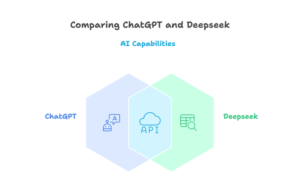5 Main Differences Between ChatGPT and Deepseek That You Probably Didn’t Know
Artificial intelligence chatbots have become an essential part of our digital lives, helping users with tasks ranging from answering queries to generating creative content. Two prominent AI models in this space are ChatGPT and Deepseek. While both are powerful tools, they have key differences that set them apart. In this article, we’ll explore five main differences between ChatGPT and Deepseek that you probably didn’t know.

1. Underlying AI Models
One of the biggest differences between ChatGPT and Deepseek lies in their underlying AI models. ChatGPT is developed by OpenAI and is based on the GPT (Generative Pre-trained Transformer) architecture, which has undergone multiple iterations, including GPT-3.5 and GPT-4. Deepseek, on the other hand, is built on a different AI framework that focuses on specialized language understanding and retrieval-based responses.
2. Training Data Sources
Both ChatGPT and Deepseek rely on vast amounts of data to generate responses, but they differ in their data sources:
- ChatGPT: Trained on a diverse dataset that includes books, articles, and web content to provide well-rounded responses.
- Deepseek: Primarily trained using domain-specific data, making it more specialized for certain industries or technical applications.
This difference affects how each AI model interprets and responds to user queries, with ChatGPT being more general-purpose and Deepseek excelling in niche areas.
3. Response Style and Accuracy
Another key difference is the way these AI models generate responses:
- ChatGPT: Designed to be conversational and creative, often providing detailed explanations and engaging responses.
- Deepseek: Focuses more on factual accuracy and concise answers, making it ideal for research-based queries.
If you’re looking for a chatbot that can generate creative content, ChatGPT is a better choice. However, if you need precise and data-driven answers, Deepseek might be more suitable.
4. Customization and Adaptability
Customization is another area where these AI models differ:
- ChatGPT: Offers fine-tuning options and API integrations, allowing businesses to adapt it for various applications.
- Deepseek: Typically optimized for specific tasks, making it less flexible but more effective in certain domains.
For businesses that require a chatbot with broad adaptability, ChatGPT is a better fit. However, for organizations that need a highly specialized AI assistant, Deepseek provides a more targeted solution.
5. Availability and Cost
The accessibility and pricing models of ChatGPT and Deepseek also differ:
- ChatGPT: Available in both free and premium versions, with OpenAI offering subscription plans for enhanced features.
- Deepseek: Often tailored for enterprise use, with pricing structures that vary based on industry-specific needs.
ChatGPT is widely accessible to the general public, whereas Deepseek is more commonly used in specialized business environments.
Final Thoughts
While both ChatGPT and Deepseek are powerful AI-driven tools, they serve different purposes. ChatGPT is a more versatile and conversational AI, ideal for general users and businesses looking for adaptable AI solutions. Deepseek, on the other hand, is designed for precision and domain-specific expertise, making it a great choice for specialized industries.
Understanding these differences can help you choose the right AI assistant for your needs. Whether you need a chatbot for creative tasks or precise research, knowing how these models compare will ensure you make the best decision.

